






Kentucky Court of Appeals Grants Stay in Domain Seizure CaseAppeals Hearing for Several Sites Will Take Place Dec. 12 |
|
|
 A Court of Appeals in Kentucky has granted a motion to delay a forfeiture hearing that will determine the fate of 141 domain names related to online gambling and poker sites.
A Court of Appeals in Kentucky has granted a motion to delay a forfeiture hearing that will determine the fate of 141 domain names related to online gambling and poker sites.
The Interactive Media Entertainment and Gaming Association (iMEGA), an Internet trade association based in Washington, D.C., asked the three-panel appeals courts to grant a stay so that the appeals court could consider iMEGA’s petition to have the lower court seizure ruling overturned.
The forfeiture hearing was scheduled for Dec. 3, but it will be delayed until the Court of Appeals can hear iMEGA’s oral arguments Dec. 12. The sites iMEGA are representing here are five online sportsbooks.
Last month, a Kentucky judge agreed with Commonwealth-hired attorneys that Kentucky has the right to seize 141 domain names its claims are used to facilitate illegal online gambling. Several poker sites were also named.
Kentucky courts have been onslaught by appeals and amicus briefs in defense of the sites in recent weeks. They’ve come from the Poker Players Alliance, Kentucky’s branch of the ACLU, the Interactive Gaming Council (IGC), The Center for Democracy and Technology, as well as many of the sites.
Both iMEGA and Canada-based IGC (which is an international online gambling trade group) claim that the judge in the lower court misinterpreted Kentucky’s law that allows state officials to seize devices used to facilitate gambling.
In this case, Judge Thomas Wingate sided with state attorneys and ruled that the Commonwealth does indeed have the right to seize domain names that are used by players to play poker and gamble.
IMEGA is arguing that Kentucky’s actions violate the Commerce Clause of the U.S. Constitution and that Kentucky justice department officials lacked the authority to even attempt the seizure in the first place.
Kentucky wants the sites to both stop doing business with its residents and also pay it collectively about $1 billion in back taxes and damages, according to an attorney who represents several dozen of the sites.
